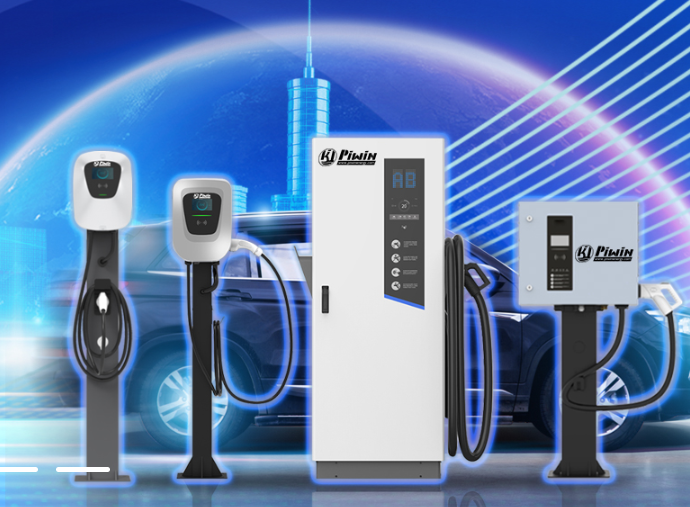
Products
Fast, Reliable, Everywhere

Solutions
Efficient, Innovative EV Charging Solutions.
News
We are committed to the innovation and application of EV charging.
Fast charging stations, sometimes called rapid charging points, are specialist electric vehicle (EV) charging stations created to deliver more electric power to quickly recharge EV batteries. These charging stations are an essential part of the EV charging infrastructure since they provide charging periods that are noticeably faster than those of regular or slow chargers. Fast charging station overcomes the problem of long charging time for home chargers, electric trains need to be charged in minutes, but not in a short time.
Rapid charging stations provide an EV battery with a large quantity of electric power, enabling a quick recharge. They are distinguished from slower chargers by their high power output.
Rapid charging stations may include numerous connections to support various EV models and charging protocols. This makes it possible for various EVs to use the charging station.
Rapid charging is possible using a variety of protocols, including CHAdeMO, CCS (and Tesla's Supercharger network. The connections, communication methods, and power levels employed for quick charging must adhere to these requirements.
Rapid charging stations are placed in strategic locations along highways, major thoroughfares, and metropolitan areas to give EV drivers quick access during longer trips or everyday commuting.
Due to the necessity for greater power infrastructure and cooling equipment to handle the heat created during rapid charging, quick charging stations may be more expensive to construct and maintain than slower chargers.
Rapid charging stations are becoming increasingly important as the market for electric cars (EVs) expands. Rapid charging stations, often called fast charging stations, are essential for solving infrastructure availability and charging time, two of the main issues with electric cars. Here's a deeper look at the development of quick charging stations and how it will affect transportation in the future:
Compared to conventional charging techniques, quick charging stations can considerably reduce the amount of time required for charging. Rapid charging stations may significantly boost a car's battery charge in only a few minutes, whereas regular home chargers may take several hours to fully charge an electric vehicle. This feature is essential for improving the practicality and convenience of EVs, making rapid top-ups and extended travels more doable.
Rapid charging points are necessary to allow electric vehicles to travel great distances. As the charging infrastructure develops, EV drivers can go further distances without worrying about running out of battery charge. This achievement is essential for boosting customer trust in electric cars as a practical substitute for conventional internal combustion engines.

Rapid charging network growth receives significant funding from governments, commercial enterprises, and energy suppliers. The need to provide a reliable charging infrastructure that can accommodate the increasing number of eV on the road motivated this initiative. The range anxiety associated with electric vehicles will lessen as more charging stations are built, making them a more appealing alternative for a wider spectrum of buyers.
They are necessary for daily commutes and city driving and are crucial for urban and suburban integration. Fast charging stations are essential for residents needing access to home charging options as metropolitan regions embrace more electric automobiles. More people may switch to electric vehicles if fast charging stations are strategically placed in suburban and metropolitan regions.
Infrastructure for charging batteries and developing battery technology coexist. As battery technologies advances, EVs can take higher charge rates, increasing the need for quicker charging stations. These developments provide a positive feedback loop, whereby quicker charging is made possible by better batteries, and more battery innovation is stimulated by faster charging.
Smart charging networks that use cutting-edge software and communication technologies will likely be a part of the future of quick charging points. These networks can manage energy consumption, optimize charging schedules, and give customers up-to-the-second information on station availability and charging costs. This degree of connection improves user experience overall and guarantees effective use of the infrastructure for charging.
Piwin's DC fast charging stations are designed to meet the needs of long-distance travelers and those looking for a fast charging option. These powerful charging stations offer fast charging capabilities. Enabling electric vehicles to charge large amounts of battery capacity in minutes. Due to the popularity of DC fast chargers on major routes. EV drivers can confidently travel long distances knowing they can easily charge at the right intervals.
For EV users who like to charge overnight at home. The Piwin Level 1 charging station is the perfect choice. These charging stations are great for overnight charging. Because they use a typical household socket and provide gradual but continuous charging. While Level 1 charging might not be the best option for mobile charging, it's a useful and affordable option for everyday use. Especially for people who have access to regular parking spaces near the house.
The Level, Two charging stations from Piwin, is the solution for quicker charging at home, the office, or public spaces. Compared to Level 1 chargers, these stations need a 240-volt power supply to begin charging. To allow cars to recharge their batteries, level 2 chargers are ideal for public parking lots, businesses, and other structures where they may be parked for many hours or longer.
Rapid charging points are a vital part of the EV environment because points can help drivers on longer excursions and experience "range anxiety" by allowing them to quickly recharge their cars. We also make EV ownership more accessible to a larger spectrum of people. With the development of electric vehicle technology and more and more automakers producing electric vehicles. Creating a comprehensive and interoperable network of fast-charging stations is critical to boosting electric vehicle adoption and sustainable transportation. A viable option for commercial enterprises looking for durable and effective charging stations is the line of premium charging solutions offered by PIWIN.
